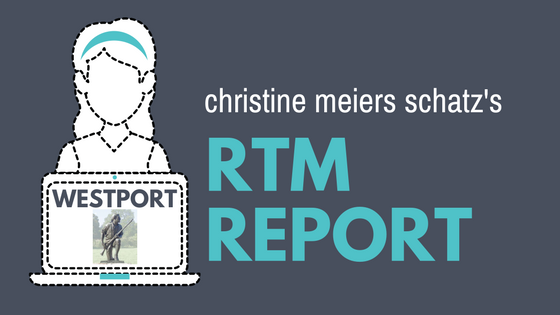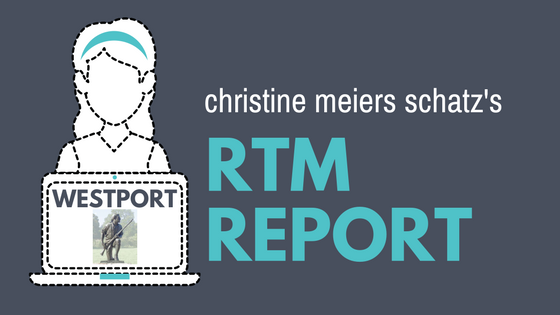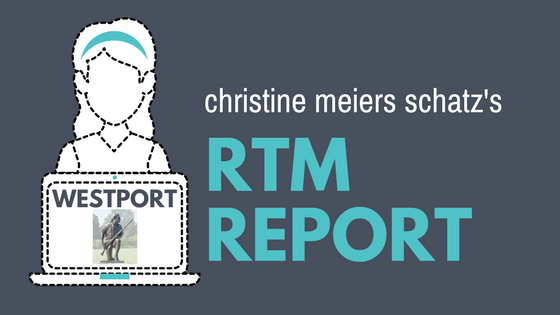Disclaimer: What’s below is my interpretation of the meeting and not an official communication from the RTM. You can view the meeting in its entirety here and read a related WestportNow.com article here.
SHORT SUMMARY:
At its meeting on January 8, 2019, the RTM did the following:
- Appropriated $70,000 for the conversion of the town hall boilers from oil to gas and the removal of the existing underground oil tank;
- Resolved not to reject a 3-year contract between the Westport Board of Education and the Westport Education Association so that the agreement would become binding;
- Discussed a proposed ordinance prohibiting the storage, disposal, or use of fracking waste or any products or by-products of fracking waste; and
- Resolved not to reject a police pension arbitration award, which caused the award to be final and binding.
DETAIL:
AGENDA ITEM #1: The appropriation of $70,000 for the conversion of the town hall boilers from oil to gas and the removal of the existing underground oil tank
In addition to covering the information in the agenda summary, Peter Ratkiewich, the Director of Public Works, explained the following
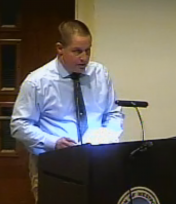 The town has a policy of replacing underground oil tanks with above-ground tanks. An above-ground tank at town hall would be large and unsightly, and a new below-ground tank would be expensive ($200,000);
The town has a policy of replacing underground oil tanks with above-ground tanks. An above-ground tank at town hall would be large and unsightly, and a new below-ground tank would be expensive ($200,000);
- The town is expected to save around $20,000 per year in heating costs by switching to gas; and
- It is advantageous to convert the two existing town hall boilers to two gas boilers rather than replacing the boilers with a single high efficiency gas boiler, which is the only possible replacement at this time, because (1) the conversion kit is less expensive and will extend the useful life of the boilers, and (2) if one boiler needs to be repaired there will still be one operating boiler.
The RTM voted unanimously to approve the appropriation.
AGENDA ITEM #2: The resolution not to reject a 3-year contract between the Westport Board of Education and the Westport Education Association so that the agreement would become binding
Superintendent Colleen Palmer and Elio Longo, the Westport Public Schools' Chief Financial Officer, provided a high-level overview of the teacher's contract.
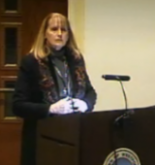 Dr. Palmer explained that members of the Board of Finance, RTM, and Board of Education ("BOE") participated in the negotiations, which she described as "positive and collaborative." The end result, according to Dr. Palmer, was a contract that is fair to both parties. She emphasized that (1) the financial implications of the contract fall within the range of other common teacher contracts within the state, and (2) the contract broadens teachers' responsibilities to "enhance the educational experience for our students." By way of example, she mentioned that the BOE may now add an advisory period to the high school schedule and that elementary teachers meet their students as they arrive at school.
Dr. Palmer explained that members of the Board of Finance, RTM, and Board of Education ("BOE") participated in the negotiations, which she described as "positive and collaborative." The end result, according to Dr. Palmer, was a contract that is fair to both parties. She emphasized that (1) the financial implications of the contract fall within the range of other common teacher contracts within the state, and (2) the contract broadens teachers' responsibilities to "enhance the educational experience for our students." By way of example, she mentioned that the BOE may now add an advisory period to the high school schedule and that elementary teachers meet their students as they arrive at school.
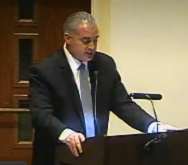 Mr. Longo provided the following overview of the financial implications of the 3-year agreement:
Mr. Longo provided the following overview of the financial implications of the 3-year agreement:
- The new teacher salary schedule will result in a yearly net incremental cost of approximately $1.5 million, $1.6 million, and $1.6 million, for a total projected cost increase of 9.25% on a simple percentage cost basis and 9.54% of compounded interest;
- The agreement increases the pay for stipend positions (such as athletic coaches) by 1% for a total projected incremental cost of $44,000;
- WEA member medical insurance contributions will increase by 1% each year, which will result in a cost avoidance of $387,000; and
- The net incremental cost of the contract over three years is approximately $4.4 million "off of a base of approximately $54 million annually for WEA employees."
I summarized certain points from the joint committee report, including an important assumption behind the figures recited by Mr. Longo above - which is that these calculations assume that no teachers leave the district or are replaced. Because the BOE tries to replace retiring teachers with lower cost employees, the incremental costs of the contract will likely be less than what is listed above.
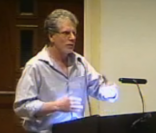 In response to a question from RTM member Matthew Mandell, Dr. Palmer explained that this contract would result in a total increase to the 2019-2020 BOE budget of just under 1% as compared to the 2018-2019 budget. This figure includes a budgeted assumption of $450,000 in savings due to teacher turnover (hiring new teachers at a lower salary than those they replaced).
In response to a question from RTM member Matthew Mandell, Dr. Palmer explained that this contract would result in a total increase to the 2019-2020 BOE budget of just under 1% as compared to the 2018-2019 budget. This figure includes a budgeted assumption of $450,000 in savings due to teacher turnover (hiring new teachers at a lower salary than those they replaced).
As Mr. Mandell pointed out, Board of Finance members recently informed the BOE that the maximum total increase they'd like to see in any BOE budget was 1.69%. That leaves approximately 0.75% for all other expenses, including salary increases that the BOE will be obligated to provide under the separate collective bargaining agreements for the school district's administrators, custodians, maintainers, nurses, paraprofessionals, and secretaries.
In response to a question from RTM member Seth Braunstein, Dr. Palmer provided the following additional information regarding the 2019-2020 budget:
- The BOE expects to reduce the workforce from all bargaining units for next fiscal year due to Coleytown Middle School being offline, resulting in cost savings (by the WPS administration's estimates as of December 10, 2018, this could be around $380,000) however
- Due to the K-6 model that the BOE might implement in the interim, the budget will increase by
- $380,000 for 4 additional school busses,
- $300,000 for mobile technology, and
- A currently unknown but much larger dollar amount for 12-14 portable classrooms (by the WPS administration's estimates as of December 10, 2018, this could be up to $840,000).
This was not discussed at the meeting but, based on these numbers, it would be difficult for the BOE to keep any increases in their budget under a ceiling of 1.69%.
The RTM voted unanimously not to reject the agreement.
AGENDA ITEM #3: Discussion regarding a proposed ordinance prohibiting the storage, disposal, or use of fracking waste or any products or by-products of fracking waste
RTM member Wendy Batteau explained that, as compared to the first draft of the ordinance, the current draft ordinance would go into effect 30 days after it is passed into law. She also noted that 55 other towns have passed anti-fracking waste ordinances, including Stamford, Greenwich, Hartford, Bridgeport, and New Haven. Ms. Batteau will be working with the pertinent RTM committees to bring the ordinance to the RTM for a vote next meeting.
AGENDA ITEM #4: The resolution not to reject a police pension arbitration award, so that the award would be final
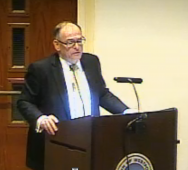 Floyd Dugas, outside counsel for the town, provided the RTM with background information regarding the police pension arbitration award:
Floyd Dugas, outside counsel for the town, provided the RTM with background information regarding the police pension arbitration award:
- Pension negotiations began in 2016 with the police and fire department unions. At that time and compared to police and fire pension plans across the state, the Westport police and fire pension plans were "richer than the norm." According to Mr. Dugas, there was anecdotal evidence that Westport police and fire retiree costs were amongst the highest in the region and the state.
- In August 2017, the town reached a tentative agreement with both the police and fire unions.
- In October 2017, the RTM approved both tentative agreements after a lengthy meeting that included requests from police and fire department members to reject the agreements. Six RTM members voted to reject the police pension agreement (Melissa Katz Kane, Jessica Bram, Catherine Calise, Jack Klinge, Jimmy Izzo, and Dee Chapman), and three RTM members abstained (Jeff Wieser, Wendy Batteau, and Chris Tait).
- Subsequently, both the fire and police department unions refused to approve the agreements.
- The town offered to decrease employee contributions to the pension plans from 10% to 9%. The fire department's union approved the pension agreement. The police department's union chose to continue on to arbitration.
- The subsequent arbitration award could be characterized as a ruling in favor of the town. It effectively resulted in the exact same outcome as the initial tentative pension agreement, including the 10% pension contribution by employees.
The arbitration cost the town over $60,000 in legal fees.
Mr. Dugas recommended that the RTM take no action with respect to the award, which would render the award final. By rejecting the award, the RTM would effectively appeal it to another arbitration panel. Mr. Dugas said that this panel generally affirms the decision of the initial arbitrators, and that the associated legal costs for the town would be around $100,000. He also pointed out that the resulting pension agreement is now in line with pension benefits for other police departments throughout the state and results in cost savings for the town of approximately $41 million over the next 20 years.
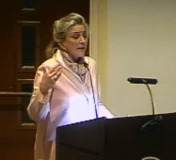 RTM member Catherine Calise expressed the view that the town should not be changing pension benefits for police officers hired before the effective date of the new pension agreement. In response, RTM member Kristan Hamlin (1) noted that the town has to strike a balance between what is fair to taxpayers and to its various employee groups, (2) explained that all labor and employment collective bargaining agreements have fixed terms and it is common practice for those terms to change, and (3) pointed out some of the ways in which the award and resulting pension agreement is still very generous, including the fact that the town typically contributes 2.6 times more than employees to the pensions and the retirement age ranges between 49 and 55.
RTM member Catherine Calise expressed the view that the town should not be changing pension benefits for police officers hired before the effective date of the new pension agreement. In response, RTM member Kristan Hamlin (1) noted that the town has to strike a balance between what is fair to taxpayers and to its various employee groups, (2) explained that all labor and employment collective bargaining agreements have fixed terms and it is common practice for those terms to change, and (3) pointed out some of the ways in which the award and resulting pension agreement is still very generous, including the fact that the town typically contributes 2.6 times more than employees to the pensions and the retirement age ranges between 49 and 55.
The RTM voted 31-1 not to reject the award, with Ms. Calise as the single dissenting vote.
Disclaimer: What’s above is my interpretation of the meeting and not an official communication from the RTM.
